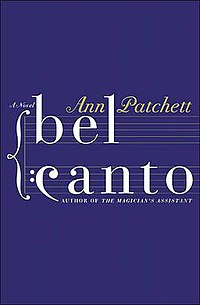
Before this is all over, I sort of hope to read a book that I hate, so that I'll have something else to write about in this space. Ann Patchett's Bel Canto is certainly not that book.
Simply put, and without giving too much away, Bel Canto begins with the birthday party of Mr. Hosokawa, a rich and renowned Japanese business man who is enticed to have his birthday party at the home of the Vice-President of an unnamed, developing South American country. The enticement is that the party's entertainment will be famed American opera star Roxanne Coss. Hosokawa is an opera aficionado, and Coss is his favorite singer. The party and performance are splendid, until they are interupted by a terrorist group who invades the house looking for the President (who is not in attendence) and procedes to hold the entire party hostage in the house. Most of the book follows both hostages and captors as they adapt to what seems to be a ridiculously long time of living together in the house.
The plot, while intriguing, is almost an afterthought to the themes of the book and the descriptions of those themes: love, languages, and, most importantly, the power of music. While the reader obviously cannot hear Roxanne Coss sing, the descriptions of her voice and presence are astounding in and of themselves, and it is clear that in the reality of the novel her voice is an almost otherworldly gift. One of many examples, taken at random, might read like this:
"All of the love and the longing a body can contain was spun into not more than two and a half minutes of song, and when she came to the highest notes it seemed that all they had been given in their lives and all they had lost came together and made a weight that was almost impossible to hear. When she was finished, the people around her stood in stunned and shivering silence."
This book is about the power of love to bridge the barriers of language and culture and class...it shows two people who cannot speak to each other in love, and two whose love is solidified while learning how to communicate with each other, and always, music is shown to be able to do much the same thing. That it begins or ends with tragedy is almost an afterthought, the music and the experience is what remains. This is a truly beautiful book.
No comments:
Post a Comment